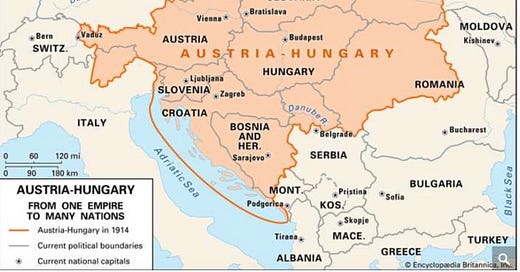Dating in the Wild, Wild West
An unlikely romance forged through emigration, survival, and silver mining.
👋 Hello, I’m Kevin Ferguson, author of 🍷 Rain on the Monte Bello Ridge,🍷 my forthcoming memoir about health, aging and winemaking. (Read the origin story of the book.) 🍇 The Centenarian Playbook is my newsletter, which features longevity tips and stories from Grandma Kay’s long life. It also includes stories of the Gemello Winery, which her late husband, Mario, ran for nearly half a century. 📖 I’m sure you’ll find my maternal grandparents are quite lovable characters.
A Match Made in the Wild West
Grandma Kay’s father was a man named Ivan Volarevic, who was part of the European mass emigration to the United States in the early 20th Century.
Ivan was born in a Croatian village of 200 residents called Dragovia in 1881. For centuries, Croatia had been ruled by foreign powers. During most of Ivan’s lifetime, Croatia was part of the Austro-Hungarian Empire, ruled by Franz Joseph, who took control in 1867.
The following year, Joseph stripped Croatia of all real control over its affairs, placing an Hungarian magnate named Ban Károly Khuen-Héderváry in charge of the region. This appointment was perhaps comparable to former President Trump appointing billionaire Betsy DeVos Education Secretary. No experience and no interest in the job.
This political neglect of Croatia was triggering part of this mass emigration. One Croatian politician at the time said the reason for emigration is “that somewhere in the world there is more good and justice.”1
Meanwhile, the rapid industrial growth in countries, like the United States, constantly attracted a new working force from underdeveloped countries. Countless agents of steamship companies, promoting a better life in America, further fueled emigration.
One summer day in 1907, my great grandfather had been sold on the American dream. At age 26, Ivan and his uncle, George, 30, made their way to the port of Trieste in the Adriatic Sea, and boarded a steamship called the Gerty with 1,430 other passengers. They arrived at Ellis Island on August 20, 1907.
Ivan made his way across the American Wild West via railroad, settling in Park City, Utah. The future home of Olympic ski slopes and movie festivals was at that time better known for silver mines. Ivan was given a hard hat and a job mining silver.
One day in 1913, one of Ivan’s coworkers showed him a photo of an attractive twenty-something woman living in Croatia. Her name was Manda Jakic. She was turning 27 that summer, but one can only imagine how old she was in the photo carried around in the wallet of Ivan’s immigrant coworker. At least a few years younger, but probably nothing unlike today’s online Tinder profiles.
Manda was living in a small village called Struga on the Una River in central Croatia. She was working as a housekeeper for a very stern and demanding homeowner.
“She wants a way out,” his coworker told Ivan. “Would you like to be set up with her?”
“Sure, let’s do it,” Ivan said.
After Ivan sent her some traveling money, she boarded the Carpathia steamship from the Trieste port. She arrived at Ellis Island on August 14, 1913. With no English-speaking skills, she boarded a train bound for Park City. A month later - September 16, 1913 - Ivan and Manda were married.
Within seven years, Manda gave birth to four boys, two (George & Philip) of whom died before their first birthdays. Her other two sons were Peter and Michael (Mitch).
Then, in June of 1921, Katia2, or as I would call her - Grandma Kay - was born.
Twenty-one days later, the family boarded a train and arrived in Gardena, Calif., so Ivan could pursue a better job with or close to his uncle, George.
Unfortunately, Ivan would only live three more years, dying in 1924 at age 43 of lung disease. He was a heavy smoker, which likely contributed to his early death. Lung disease was also common among miners due to poor working conditions.3
Meanwhile, Manda was pregnant with their fourth child, Mary, at the time of Ivan’s death.
The quote is from S. Radic, a Croatian politician during the period, in his book Modern Colonization and the Slavs.
Katia Volarevic was her birth name, but her older brother, Pete, Americanized it as “Kathryn Volarvich” in grade school.






A fascinating story. I'm wondering how Manda managed after her husband's death, having lost two children in a foreign country, where she, I suppose, had no other family. You really had to be resilient to survive in these conditions!
What a great story is this.. This part especially resonated with me a lot as an immigrant to the US..
“that somewhere in the world there is more good and justice.”